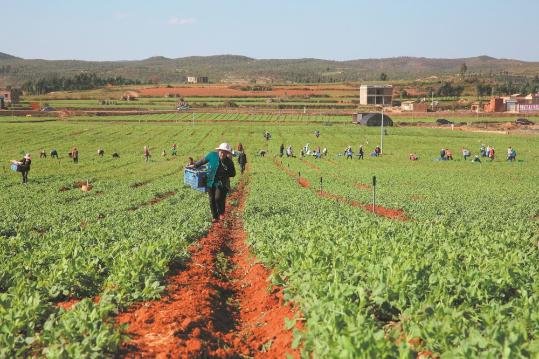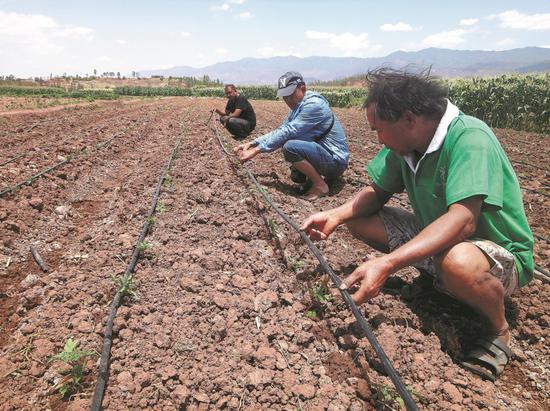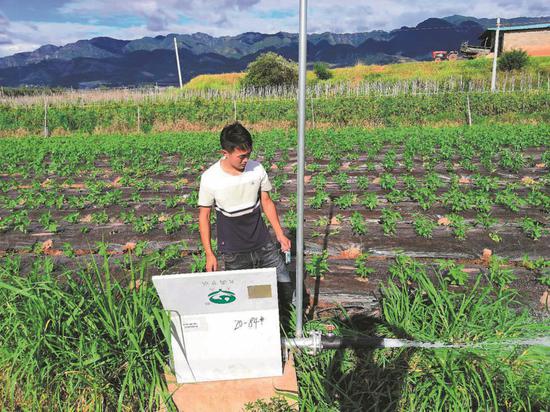Project gives farmers stable water supply
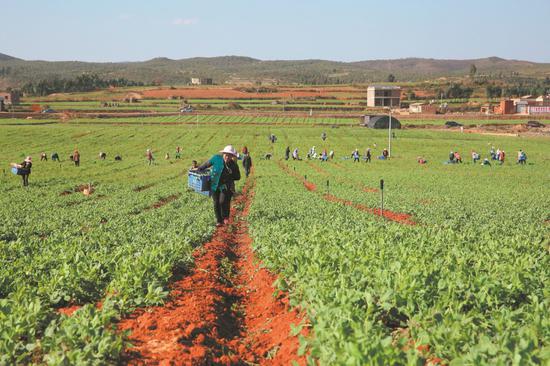
Farmers harvest vegetables at a field irrigated through the Bingjian area project in Yuanmou, Yunnan province. (CHINA DAILY)
For generations, farmers in the Bingjian irrigation area in Yunnan province's Yuanmou county had to perform a laborious irrigation ballet, a delicate dance of cooperation and shared sacrifice heavily reliant on two reservoirs.
Every 15 to 20 days during the irrigation seasons, the reservoirs' sluice gates would open, bringing a sigh of relief to the farmers of the 7,600 hectares of farmland in the area, where the evaporation rate is six times that of rainfall. The water release, however, would only last for a week, forcing farmers to race against time to irrigate in turn, remaining ever vigilant against water theft.
"My family would join seven or eight other households to apply for permission to take water," said Liu Xianhua, a 41-year-old farmer from Yuelinglong village. Then, while one household irrigated, the others guarded the channels to prevent unauthorized withdrawals."
Farmers usually bought a permit to divert water into their farmland for a certain period of time, paying based on the time span and water velocity.
The mission of irrigating the farmlands for all the families was often a tiring and sleepless operation that stretched for a whole day and sometimes even longer, Liu said.
But now they have been unshackled from the tyranny of the shared water schedule, and are free to irrigate whenever their fields whisper their thirst. "With a mere swipe of a card, I can irrigate my farmland any time now," Liu smiled.
The change has come about as a result of a public-private partnership irrigation project, initiated in 2016 and put into operation in 2018.
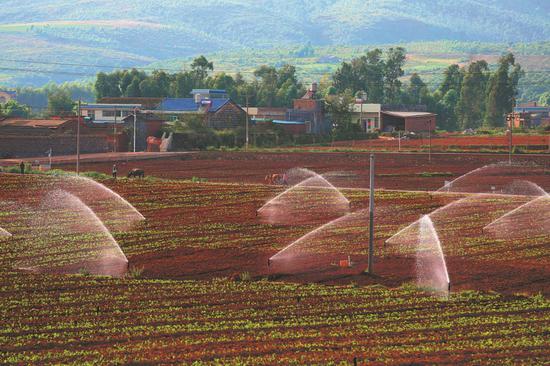
A field is irrigated through the project in the Bingjian irrigation area. (CHINA DAILY)
Spearheaded by Dayu Irrigation Group Co, the project involved the construction of water diversion pipes and an intelligent water consumption management system that provides farmers with smart meters for 24-hour access to water. It has not only simplified irrigation but also transformed the once parched farmlands into reliable sources of income for farmers.
During traditional irrigation, officials used to face immense stress during water discharge periods, explained Zhou Jianqiang, deputy head of the Yuanmou Irrigation Management Bureau.
For seven days straight, over 20 officials had to join farmers patrolling the channel in the Bingjian area, each responsible for about 1 kilometer. They got some rest whenever possible in a small irrigation management house, he said.
However, water disputes still arose among villagers. Fueled by a desperate need to save their withering crops, these conflicts occasionally erupted into violence, the official said.
This project has not only significantly reduced the burden on irrigation officials but also eliminated factors that could potentially lead to water conflicts, Zhou said.
He emphasized, however, that the project wouldn't have been possible without the participation of Dayu Irrigation Group, which contributed nearly 48 percent of the total investment of 308 million yuan ($43.4 million).
"Funding this project solely through government investment would have been a challenge," he said.
Additionally, Dayu possesses extensive experience in operating such modern irrigation systems, he added. Their advanced technology allows for real-time monitoring of the water pressure and flow rate in pipes, alerting for leaks, and also statistically calculating water consumption and fees.
Compared to traditional flood irrigation, the new pipeline irrigation system, which makes it possible for farmers to bring in drip irrigation equipment, reduces water consumption by approximately 225 to 300 cubic meters per hectare. Overall, this translates to an annual water saving of 21 million cubic meters, roughly equivalent to the storage capacity of a medium-sized reservoir, he said.
During a persistent drought in August, a daily supply of 50,000 tons of water was provided through the system, ensuring a one-month buffer to support farmers in their fight against the dry spell, he said. This extended support, despite resource constraints, significantly aids in mitigating the impact of droughts.
"Without the irrigation project, we would be confronted with a much grimmer drought relief situation this year," he said.
For the Bingjian area, the irrigation management bureau now only needs to facilitate water diversion to ensure irrigation supply, though it also sometimes helps the Dayu company with water disputes, according to Zhou.
Managing the extensive irrigation system with 34 water diversion stations is no small feat for the 24 employees at Dayu's branch in Yuanmou. However, a cooperative mechanism involving water users not only facilitates project management but also empowers them economically, explained Bi Jinxiang, an employee with the branch company.
Some project pipelines are located beneath agricultural land, leading to the potential issue of leakages requiring digging and potential crop damage during repairs. Some farmers have demanded excessive compensation for damaged crops, causing disputes, she said.
She said the cooperative structure comprises 16 village branches headed by the respective village Party chiefs, and these groups play a crucial role in managing disputes within the project.
As Bi mentioned, this structure was instrumental in resolving disputes like crop compensation claims during leak repairs, as the respected Party chiefs facilitated more reasonable and fair compensation settlements based on actual losses.

